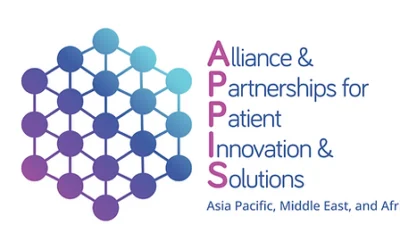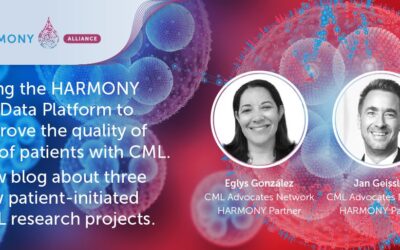This summary will cover a few of the important topics regarding CML that were presented at ASH 2019 including:
- New Drugs for CML
- Update on the French and German Interferon combination studies
- Age-adjusted treatment in CML– Elderly and Pregnancy report for young CML patients. (our report regarding pediatric CML was published separately).
- Generic Imatinib
New drugs for CML in clinical trials
At Ash this year there was an update on 3 new drugs in trials that were presented also last year.
HQP1351-
– Please, click on the image to check and download the poster in detail –
Presented at an oral session by Dr. Qian Jiang whom we know well from CML HZ- This was an update on the safety and efficacy of phase 1 study of this new Chinese 3 ed generation BCR-ABL inhibitor. It was designed to overcome resistance to other TKIs and overcome mutations including the T315I. The study’s endpoints included reaching a maximum tolerated dose as well as safety and efficacy.
101 patients participated out of which 87 were in the chronic phase and 14 in the accelerated phase. 83 of them had at least 2 previous TKIs, and 63 possessed the T315I mutation. At the cutoff date on 27.5.2019 43 patients were on 30 mg, 30 on 40 mg, 3 on 45 mg, 14 on 50 mg, and 9 discontinued treatment out of which 5 because of progression and 2 due to intolerance.
The main hematologic adverse events included Thrombocytopenia in 76 patients out of which 50 were grade 3/4 and 6 were serious. Interestingly T315I mutation and CHR at baseline were found to be associated with decreased incidence of grade 3/4 hematologic adverse events.
The response rates for CHR was 95%, CCyR 61% and MMR 37%. Patients with the T315I had a better response: 97%, 78% and 52 % respectfully. Pivotal phase 2 studies are now ongoing in China.
For more information, please, visit the #ASH19 website and check the full Abstract HERE.
K0706-
– Please, click on the image to check and download the poster in detail –
Presented as a poster by Cortes- K0706 is a selective oral TKI designed using structure-guided drug design to inhibit BCR-ABL activity. The data presented safety and efficacy from the Phase 1 trial for CML patients who have failed at least 3 previous TKIs.
The endpoints were to determine the Maximum Tolerated Dose (MTD) and recommended Phase 2 dose (RP2D)., as well to evaluate safety and therapeutic activity. 40 patients participated and 14 patients withdrew due to disease progression.
The hematological and non-hematological adverse events were similar to those observed with other TKIs and most of them grade 1\2. K0706 has shown promising efficacy and favorable safety profile in heavily pre-treated patients. The MTD was established at 204 mg a day and RP2D is 174 mg\day.
The recruitment to Phase 2 study was initiated.
PF-114-
A 4th generation TKI from Russia. The data presented was also from Phase 1 study with 51 CML patients in chronic phase who failed at least 2 TKIs or have the T315I mutation. The primary endpoints were to establish Dose Limiting Toxicities (TLTs) and the MTD as well as to evaluate safety and anti-tumor activity. The MTD was 600 mg and the main side effect was grade 3 psoriasis like skin lesions. 21 patients had grade 3\4 adverse events and 35 patients discontinued the treatment 18 of them due to disease progression. There were no vascular events observed. 5 out of 12 patients with T315I mutation at enrolment responded with 3 MCyR, 1 CCyR and 1 CHR. The dose of 300 mg was determined to the next study of Phase 3.
You can find information about this poster on the #ASH19 website HERE.
Update on the French and German Interferon combination trials-
The French combination of Nilotinib+Pegaleted IFN-
 This oral presentation from the national French Phase 2 study, showed somewhat higher cumulative incidence rates of MR4.5 at 36 months with the combination compared to Nilotinib alone. 200 patients enrolled 99 in Nilotinib alone and 101 in the combination. At 12 months MR4.5 in the Nilotinib arm was 15.22 % compared to 24.21 % in the combo arm. 7 patients mutated on Nilo arm compared to 2 on the combination arm. On the other hand 7 % had grade 3\4 hematological adverse events on Nilo arm compared to 15 % on the combination arm. 22 patients discontinued the study on the Nilo arm compared to 19 on the combo.
This oral presentation from the national French Phase 2 study, showed somewhat higher cumulative incidence rates of MR4.5 at 36 months with the combination compared to Nilotinib alone. 200 patients enrolled 99 in Nilotinib alone and 101 in the combination. At 12 months MR4.5 in the Nilotinib arm was 15.22 % compared to 24.21 % in the combo arm. 7 patients mutated on Nilo arm compared to 2 on the combination arm. On the other hand 7 % had grade 3\4 hematological adverse events on Nilo arm compared to 15 % on the combination arm. 22 patients discontinued the study on the Nilo arm compared to 19 on the combo.
The addition of Peg-IFN did not lead to reduction of Nilotinib dose . So far the rate of sustained Deep Molecular response did not differ between the arms so it is too early to analyze the added advantage to allow TFR with the combination arm.
For more information about this presentation, please visit the ASH website HERE.
The German TIGER Nilotinib +/- Peg IFN Induction and Nilotinib or Peg IFN maintenance therapy in Chronic phase newly diagnosed CML patients-
This oral presentation of the study by Andreas Hochhaus was based on the knowledge that there are increasing rates of adverse events with long term TKI therapy, as well as IFN may promote an Immunological response and also support TFR.

717 patients recruited, 25 for the pilot phase and 692 for the 2 arms.231 (one third) of them discontinued the study, 65 from the Nilotinib arm and 166 from the combination arm.
MR4.5 at 18 months was 23.1% on the Nilotinib arm and 32.6 on the combination arm. In conclusion, better molecular response rates on the combination allows TFR in a significant proportion of patients. A DMR will be achieved faster with the combination and PEG IFN can be used as a maintenance therapy after TKI discontinuation.
You can find the full content of this Abstract HERE.
Age-adjusted treatment in CML
Bosutinib Dose Optimization in Elderly CML patients in 2 ed line of TKI-
This study was based on the fact that median age of resistant or intolerant CML patients is higher than 60 and in elderly patients Dasatinib and Nilotinib toxicity if more frequent and clinically relevant. Also, the assumption was that Bosutinib 500 mg may be higher than necessary for this group.
 63 patients over 60 (median age 73), and with 1 previous TKI were recruited. From the dose-escalation plan 4 were treated with 200 mg, 47 with 300 mg and 12 with 400 mg. 65 % reached MMR, 40 % MR4 and 19 % MR4.5.
63 patients over 60 (median age 73), and with 1 previous TKI were recruited. From the dose-escalation plan 4 were treated with 200 mg, 47 with 300 mg and 12 with 400 mg. 65 % reached MMR, 40 % MR4 and 19 % MR4.5.
Like expected patients who joined the study due to intolerance did much better than patients who joined due to resistance. Liver function, skin rash and diarrhea were the most common nonhematologic side effects, but none grade 4. 13 of the 63 patients went off the study due to adverse events, treatment failure or death. The author concludes that in elderly patients who need to switch treatment after 1 st line Bosutinib is a good option inducing MMR in 65 % of patients.
Dose adaptation according to molecular response is feasible with only a few patients increasing to 400 mg. with median observation of 12 months, 79 % are still on Bosutinib and 88 % of them on 300 mg.
In a similar topic poster by an Italian group of data from real-life with 91 patients over 65 years, it was shown that Bosutinib is effective with a favorable safety profile in elderly patients with important comorbidities after resistance or intolerance to previous TKI.
Pregnancy management in CML patients-
This oral presentation by the Italian and Russian groups reported on 224 outcomes of the ELN database. The background is that pregnancy in CML is no longer precluded and TKI discontinuation and IFN can be used to plan and carry a pregnancy in a female CML patient. The fact that CML age at diagnosis is much younger in developing countries makes it increasingly important to be able to manage a pregnancy.It is known that TKis could be stopped early when becoming pregnant due to their teratogenic effects. Currently, there are no official guidelines to assist patients and clinicians in decisions making. The report was a multicenter observational study.
The trial started in 2014 with data collected back to 2000 and it is updated to December 2019. The data was collected from 17 countries and 19 sites. It shows that Fertility, conception and delivery for female partner of a CML male patient poses a limited concern. Female patients should stop any TKI at first positive pregnancy test and no treatment should be given at least until organogenesis is complete- 13-15 weeks. After this period and after the placenta is formed, TKis with low placental penetration (Imatinib or Nilotinib) can be considered along IFN. The babies born from a CML patient are not different from those born from the general population and they do not exhibit an increased rate of abnormalities.

From 47 patients diagnosed with CML while pregnant, 16 were not treated until delivery. 48 children were born (1 twin) and no congenital abnormalities observed. There were 75 patients with DMR at pregnancy onset.
They had 81 pregnancies and 81 children born (1 twin). 66 of the patients conceived while on TKI. 59 out of the 80 pregnancies did not receive any treatment during the pregnancy.
There were also 90 patients who conceived while being less than MMR so not eligible for TFR. 95 children were born. Mild problems reported in 4 children and 4 patients progressed to blast crisis after pregnancy and were all found to be non-comoliant.
There was 1 patient who refused to stop Dasatinib and the baby dies in week 27 with multiple malformations related to the drug, confirming the need to avoid Dasatinib at any time during pregnancy. The study confirms that CML patients can pursue a normal life including planning a family. An early TKI interruption at the first positive pregnancy test (4-5 weeks) does not seem to be associated with congenital abnormalities. Patients at pregnancy onset can delay therapy without risking future CML outcomes.
Please, visit the #ASH19 website to review the full Abstract HERE.
Generic Imatinib
There were 2 posters which compared original Glivec with generic Imatinib. The first one by a group from Turkey analyzed the efficacy and safety of their 192 patients from 2000 to 2018. 102 patients on Glivec were compared to 90 patients on generics from 5 companies.
They found that the rates of treatment failure at 3 months, according to the ELN guidelines, were significantly higher in the generic group than the Glivec group. The same was true for treatment failure at 6 months. The CHR at 3 and 6 months, was similar in both groups, and overall survival was similar in both groups.
The second poster by an Indian group analyzed the safety and overall survival of patients on Glivec and Generic. It was like the Turkish study, a single-center retrospective study. The response was assessed according to the NCCN 2019 guidelines. 109 patients were included out of which 47 patients on Glivec and 62 on Generic. OS and PFS were similar in both groups at 36 months of median follow up, but higher MMR and DMR were observed in the Glivec group.
There was no difference in the safety profile of the 2 groups. The group concludes that generic IM has good efficacy and safety profile and its affordable cost makes it reachable to the majority of CML patients in low and middle-income countries.
– To download this report as a PDF file, please, click HERE –





